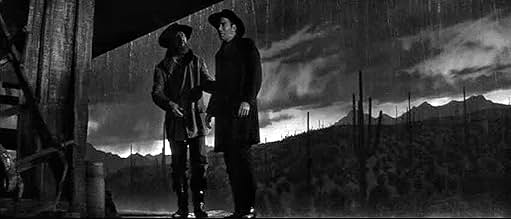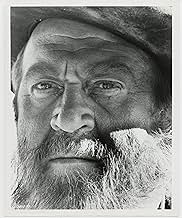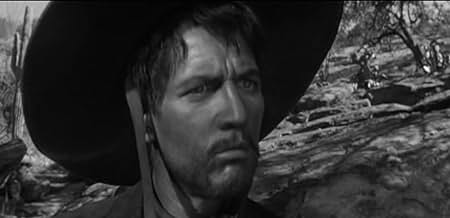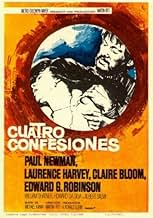IMDb RATING
6.2/10
2.6K
YOUR RATING
Travelers in the 1870s Southwest discuss a recent murder trial in which all the principals told differing stories about the events.Travelers in the 1870s Southwest discuss a recent murder trial in which all the principals told differing stories about the events.Travelers in the 1870s Southwest discuss a recent murder trial in which all the principals told differing stories about the events.
Featured reviews
Having never seen Rashomon I'm at bit of a disadvantage in writing about The Outrage. Nevertheless it's an attempt at something a little more unusual than the average western.
As even the beating of Rodney King caught on videotape was successfully challenged in a court of law, what does that say about eye witness testimony? The Outrage is the story of an incident on a western trail that left a traveler dead and his wife ravaged by a bandit on the run.
Rashomon the film is only the grandfather of The Outrage. It was first adapted as a Broadway play with Rod Steiger and Noel Willman playing the roles that Paul Newman and Laurence Harvey have on screen. It ran for 159 performances in the 1959 season and Claire Bloom who was Mrs. Rod Steiger at the time was the only one to repeat her role. Rod Steiger would have been a far better choice to repeat for the screen and he certainly has the screen name recognition. Newman was better box office, but Steiger was far better at playing all kinds of ethnic types.
Added to the screen are the characters of Edward G. Robinson and William Shatner playing a conman and a disillusioned minister whose conversations with prospector Howard DaSilva provide a kind of narrative framework for the proceedings. DaSilva provides one of four versions of the events.
All we know for certain is that Claire Bloom got violated by Paul Newman and Laurence Harvey wound up dead. At Newman's trial, he and Bloom provide differing accounts of what happened. An old Indian medicine man played by Paul Fix came upon a dying Laurence Harvey and Fix repeats it for the court. And then DaSilva tells Shatner and Robinson yet another version of the same events.
Bloom is a southern belle, not quite of the upper crust, she married well and she does her best to imitate the behavior of one of the upper crust, no doubt taking Scarlett O'Hara as her model. Laurence Harvey is Ashley Wilkes had he married a road show version of Scarlett instead of Melanie Hamilton. Repeating her performance from Broadway, I'd say Claire was the best one in this film.
The conclusion was most unsatisfactory in my humble opinion, the focus could have and should have stayed on the three protagonists not on the witnesses. Still The Outrage is definitely a most adult western.
As even the beating of Rodney King caught on videotape was successfully challenged in a court of law, what does that say about eye witness testimony? The Outrage is the story of an incident on a western trail that left a traveler dead and his wife ravaged by a bandit on the run.
Rashomon the film is only the grandfather of The Outrage. It was first adapted as a Broadway play with Rod Steiger and Noel Willman playing the roles that Paul Newman and Laurence Harvey have on screen. It ran for 159 performances in the 1959 season and Claire Bloom who was Mrs. Rod Steiger at the time was the only one to repeat her role. Rod Steiger would have been a far better choice to repeat for the screen and he certainly has the screen name recognition. Newman was better box office, but Steiger was far better at playing all kinds of ethnic types.
Added to the screen are the characters of Edward G. Robinson and William Shatner playing a conman and a disillusioned minister whose conversations with prospector Howard DaSilva provide a kind of narrative framework for the proceedings. DaSilva provides one of four versions of the events.
All we know for certain is that Claire Bloom got violated by Paul Newman and Laurence Harvey wound up dead. At Newman's trial, he and Bloom provide differing accounts of what happened. An old Indian medicine man played by Paul Fix came upon a dying Laurence Harvey and Fix repeats it for the court. And then DaSilva tells Shatner and Robinson yet another version of the same events.
Bloom is a southern belle, not quite of the upper crust, she married well and she does her best to imitate the behavior of one of the upper crust, no doubt taking Scarlett O'Hara as her model. Laurence Harvey is Ashley Wilkes had he married a road show version of Scarlett instead of Melanie Hamilton. Repeating her performance from Broadway, I'd say Claire was the best one in this film.
The conclusion was most unsatisfactory in my humble opinion, the focus could have and should have stayed on the three protagonists not on the witnesses. Still The Outrage is definitely a most adult western.
Paul Newman plays a Mexican bandit so convincingly in "The Outrage" (Martin Ritt, 1964) that it's extremely difficult to recognize Newman at all. Far from being a star vehicle, the Paul Newman "persona" isn't recognizable here in the least. I must admit that for quite a while, I kept wondering when Newman was going to finally arrive on the screen, before it dawned upon me that Newman was playing the bandit. I wouldn't deem his amoral, animalistic, lusty performance brilliant because it constitutes a rather stereotypical caricature of a Mexican bandit. Nevertheless, Newman disguises himself so dramatically, to the point where "Paul Newman" is almost invisible, that his performance becomes noteworthy just the same.
Overall, Martin Ritt's Western remake of Akira Kurosawa's landmark and legendary "Rashomon" (Kurosawa, 1950) is worth viewing despite some obvious flaws. Ritt doesn't add anything new to Kurosawa's famous study in subjective truth and point-of-view prejudice, and at times, "The Outrage," which was also taken from a then-recent Broadway play, appears a bit flat and copied. Indeed, it occasionally seems as if Ritt grows bored with the story that he's copying from Kurosawa and Broadway and that he's yearning for comedy and satire in his otherwise straight remake. However, those alternative tones are never fully developed and as a result the film fails to make a dynamic impact. That same year, over in Spain, Italian director Sergio Leone remade Kurosawa's Samurai classic "Yojimbo" (1961) as a Western, but he did so with epochal results, largely because he brought a whole new visual style (a patient, rhythmic balance of stunning panorama and extreme close-ups) and directorial slant (a fluid study in operatic nihilism and surrealism) to Kurosawa's story. In other words, Leone remade a Kurosawa film and in doing so, he transformed it into something vastly different. In "The Outrage," Ritt fails to pull off the same trick.
That said, there are some aspects that recommend "The Outrage" to the viewer, and Newman's chameleon performance is just one of them. All of Ritt's remarkable directorial trademarks are on display here: his ambiguity; his objectivity; his refusal to condescend to the audience; the moral shadiness that he evokes; his rejection of black-or-white moral simplicity; his implicit and unstrained social commentary (in this case revolving around the holy trinity of race, class, and gender, not to mention regionalism); his spare, ominously striking visuality; his meditative pacing. Perhaps most noteworthy is James Wong Howe's haunting black-and-white cinematography, which reflects an ominous glow and projects an apocalyptic sensibility rather than Western grandeur. Instead of macrocosmic vistas, Howe's compositions capture a sense of claustrophobia, moral confusion, and subjective truth thanks to their low-angle and eye-level confinement. Through his camera-work, the Western landscape becomes not a romantic frontier or an open-air arena, but instead an entangling thicket where honor and honesty descend in a squalid ravine. Most remarkable are the crepuscular, stormy, forbidding shots of a forsaken railway station during a desert thunderstorm. It is here that three observers (one of which is deliciously played by the always memorable Edward G. Robinson) discuss the different versions of truth while refraining from spelling out the implications for the audience. Ritt, as usual, forces the viewer to think for him or herself. And what Ritt reveals are the human motivationspride, vanity, contempt, guilt, shame, distrust, lust, cowardice, avarice, survivalthat color the notion of truth and ultimately render it subjective. Unfortunately, as a straight remake, "The Outrage"'s presentation of these themes is a little too flat and perfunctory to leave a fresh impact. Still, the film is compelling and curious, standing as an artistic, sobering Western and the most obscure oater that Paul Newman ever starred in. And of course, Newman virtually obscures himself by becoming another.
Overall, Martin Ritt's Western remake of Akira Kurosawa's landmark and legendary "Rashomon" (Kurosawa, 1950) is worth viewing despite some obvious flaws. Ritt doesn't add anything new to Kurosawa's famous study in subjective truth and point-of-view prejudice, and at times, "The Outrage," which was also taken from a then-recent Broadway play, appears a bit flat and copied. Indeed, it occasionally seems as if Ritt grows bored with the story that he's copying from Kurosawa and Broadway and that he's yearning for comedy and satire in his otherwise straight remake. However, those alternative tones are never fully developed and as a result the film fails to make a dynamic impact. That same year, over in Spain, Italian director Sergio Leone remade Kurosawa's Samurai classic "Yojimbo" (1961) as a Western, but he did so with epochal results, largely because he brought a whole new visual style (a patient, rhythmic balance of stunning panorama and extreme close-ups) and directorial slant (a fluid study in operatic nihilism and surrealism) to Kurosawa's story. In other words, Leone remade a Kurosawa film and in doing so, he transformed it into something vastly different. In "The Outrage," Ritt fails to pull off the same trick.
That said, there are some aspects that recommend "The Outrage" to the viewer, and Newman's chameleon performance is just one of them. All of Ritt's remarkable directorial trademarks are on display here: his ambiguity; his objectivity; his refusal to condescend to the audience; the moral shadiness that he evokes; his rejection of black-or-white moral simplicity; his implicit and unstrained social commentary (in this case revolving around the holy trinity of race, class, and gender, not to mention regionalism); his spare, ominously striking visuality; his meditative pacing. Perhaps most noteworthy is James Wong Howe's haunting black-and-white cinematography, which reflects an ominous glow and projects an apocalyptic sensibility rather than Western grandeur. Instead of macrocosmic vistas, Howe's compositions capture a sense of claustrophobia, moral confusion, and subjective truth thanks to their low-angle and eye-level confinement. Through his camera-work, the Western landscape becomes not a romantic frontier or an open-air arena, but instead an entangling thicket where honor and honesty descend in a squalid ravine. Most remarkable are the crepuscular, stormy, forbidding shots of a forsaken railway station during a desert thunderstorm. It is here that three observers (one of which is deliciously played by the always memorable Edward G. Robinson) discuss the different versions of truth while refraining from spelling out the implications for the audience. Ritt, as usual, forces the viewer to think for him or herself. And what Ritt reveals are the human motivationspride, vanity, contempt, guilt, shame, distrust, lust, cowardice, avarice, survivalthat color the notion of truth and ultimately render it subjective. Unfortunately, as a straight remake, "The Outrage"'s presentation of these themes is a little too flat and perfunctory to leave a fresh impact. Still, the film is compelling and curious, standing as an artistic, sobering Western and the most obscure oater that Paul Newman ever starred in. And of course, Newman virtually obscures himself by becoming another.
Directed by Martin Ritt, The Outrage is a remake of the 1950 Akira Kurosawa film Rashomon, that in turn is based on stories by Ryūnosuke Akutagawa, but Ritt has reformulated it in a Western setting. It stars Edward G. Robinson, Paul Newman, Laurence Harvey, Claire Bloom, Howard Da Silva & William Shatner. The story remains the same as four people give contradictory accounts of a rape and murder during the trial of Mexican bandit Juan Carrasco (Newman). The story is told within a flashback framework of three men waiting for a train at a rain soaked Southwestern station-a prospector (Da Silva), a con man (Robinson) and a preacher now struggling with his faith in humanity (Shatner). As each story is told the validity of each account comes under scrutiny, could it be there was a gross miscarriage of justice at the trial?
Perhaps unsurprisingly, this remake of a well regarded classic was a commercial flop, with many front line critics particularly savage in their reviews. Which while acknowledging it's a long way away from style and tone of Kurosawa's movie, it's hardly the devil's spawn either. Solidly constructed by Ritt and potently shot in black & white by James Wong Howe (vistas however are in short supply), the story is strong enough to make for an interesting social conscious Oater. There's some misplaced humour in the final third, and a charge of overacting from the talented cast is fair enough (especially Bloom); but maybe, just maybe, Ritt and his team deserve a little leeway for trying a different approach? I mean at least it's not a shot for shot remake eh?
Certainly Newman could never be accused of not being bold or daring with his role selections, one only has to look at his Western film's to see that. Especially the three he did with Ritt: Hud (1963), The Outrage (1964) & Hombre (1967), three very different roles, and each of a different ethnicity too. Throw in his intense turn as Billy The Kid in Arthur Penn's The Left Handed Gun, and it makes a mockery of those people who pop up from time to time proclaiming Newman had limited range! Is he miscast as Bandido Carrasco in The Outrage? No not really, he throws himself into the role and without prior knowledge of whose under the hat, it's not overtly evident it's the great blue eyed man performing. Sure a Mexican actor would have been better for the role, and definitely Rashomon wasn't in need of a remake. But for Western fans, and especially for fans of Newman, The Outrage still has enough to warrant spending a pie and a pint of beer with. Not particularly great, but not exactly bad either. 6.5/10
Perhaps unsurprisingly, this remake of a well regarded classic was a commercial flop, with many front line critics particularly savage in their reviews. Which while acknowledging it's a long way away from style and tone of Kurosawa's movie, it's hardly the devil's spawn either. Solidly constructed by Ritt and potently shot in black & white by James Wong Howe (vistas however are in short supply), the story is strong enough to make for an interesting social conscious Oater. There's some misplaced humour in the final third, and a charge of overacting from the talented cast is fair enough (especially Bloom); but maybe, just maybe, Ritt and his team deserve a little leeway for trying a different approach? I mean at least it's not a shot for shot remake eh?
Certainly Newman could never be accused of not being bold or daring with his role selections, one only has to look at his Western film's to see that. Especially the three he did with Ritt: Hud (1963), The Outrage (1964) & Hombre (1967), three very different roles, and each of a different ethnicity too. Throw in his intense turn as Billy The Kid in Arthur Penn's The Left Handed Gun, and it makes a mockery of those people who pop up from time to time proclaiming Newman had limited range! Is he miscast as Bandido Carrasco in The Outrage? No not really, he throws himself into the role and without prior knowledge of whose under the hat, it's not overtly evident it's the great blue eyed man performing. Sure a Mexican actor would have been better for the role, and definitely Rashomon wasn't in need of a remake. But for Western fans, and especially for fans of Newman, The Outrage still has enough to warrant spending a pie and a pint of beer with. Not particularly great, but not exactly bad either. 6.5/10
This remarkable 1964 film has many virtues, among them a strong script, fine photography, and a pre-Kirk William Shatner (whose idiosyncratic acting style is already well-developed, however).
The story is a Westernization of "Rashomon", the story of a rape and murder told from the points of view of three participants and an outsider. The contrast between the subjective stories (told by the bandit, the husband, and the wife) and the story told by the miner who witnesses what really happens is both hilarious and thought provoking.
Everyone is in fine form, but DaSilva's miner and Edward G. Robinson's snake oil salesman are especially fine. Newman's portrayal of the Mexican bandit is often over-the-top, but always interesting.
This is one of those movies that makes one wonder if Mr. Maltin saw the same thing. I think that it is one of the better films of the 60's, a decade that produced a great many of the best movies ever made.
The story is a Westernization of "Rashomon", the story of a rape and murder told from the points of view of three participants and an outsider. The contrast between the subjective stories (told by the bandit, the husband, and the wife) and the story told by the miner who witnesses what really happens is both hilarious and thought provoking.
Everyone is in fine form, but DaSilva's miner and Edward G. Robinson's snake oil salesman are especially fine. Newman's portrayal of the Mexican bandit is often over-the-top, but always interesting.
This is one of those movies that makes one wonder if Mr. Maltin saw the same thing. I think that it is one of the better films of the 60's, a decade that produced a great many of the best movies ever made.
Sometimes, I'm amazed at the low level of commentary on these films. This one is no exception. The reviewer opening these comments comments on a "Western" as if this were a Roy Rogers or Gene Autry oater. While I'm aware that we all have the right to express our views, I would like to see a little more insight on those selecting which reviews will be presented. This film is a remake and reset of the Kurusawa classic and is a classic in its own right. Fine, fine performances are given by Newman, Harvey, Bloom, Shatner(in his pre-Kirk days), Robinson, Salmi, Da Silva and Fix in this casting of a Japanese film play-- which is a composite of two stories, BTW-- by Akira Kurusawa. It's not perfect. The role of the medium, the old Indian shaman portrayed by veteran character actor, Paul Fix, doesn't have the cultural impact of the original. There is confusion around the rape and fight scene, but these are small things. The film is marvelous and the black and white setting captures much of the shading and light contrasts of the original Rashomon. The story in both films, which Kurusawa wove out of two earlier stories, is full of archetypes but lacking much of the impending chaos of the original. The first tale of the old gate at kyoto tells of a ronin confronting an old woman and taking the blanket from an abandoned child in the time of civil war and political upheaval; the other tale, in the woods, tells of the various versions of rape, murder, honor and shame, told by each of the participants. Kurusawa blended them into an excellent film story. While the cultural background of the original sets it apart from this American version, there is much that does make it work. The genteel Southern couple, the Mexican bandido, the pragmatic sheriff, the country preacher, the snake-oil salesman and the miner/prospector, fit the Samurai, bandit, medium, etc., of the original very well. So, face it. It ain't John Wayne. But it's good cinema at it best.
Did you know
- TriviaPaul Newman opposed sound looping the picture, stating it interfered with the actors' performances, so a small (for that time) chest microphone was developed that eliminated around eighty percent of dialog looping, and saved its associated post-production costs as well.
- GoofsWhen the Wife (Bloom) is fighting Juan (Newman), she falls and hits the camera rig, causing the picture to shake a little.
- Crazy creditsExcept for the title and company name, the beginning of the movie has no opening credits.
- ConnectionsFeatured in MGM 40th Anniversary (1964)
- How long is The Outrage?Powered by Alexa
Details
Box office
- Budget
- $3,000,000 (estimated)
- Runtime
- 1h 36m(96 min)
- Color
- Aspect ratio
- 2.39 : 1
Contribute to this page
Suggest an edit or add missing content

















